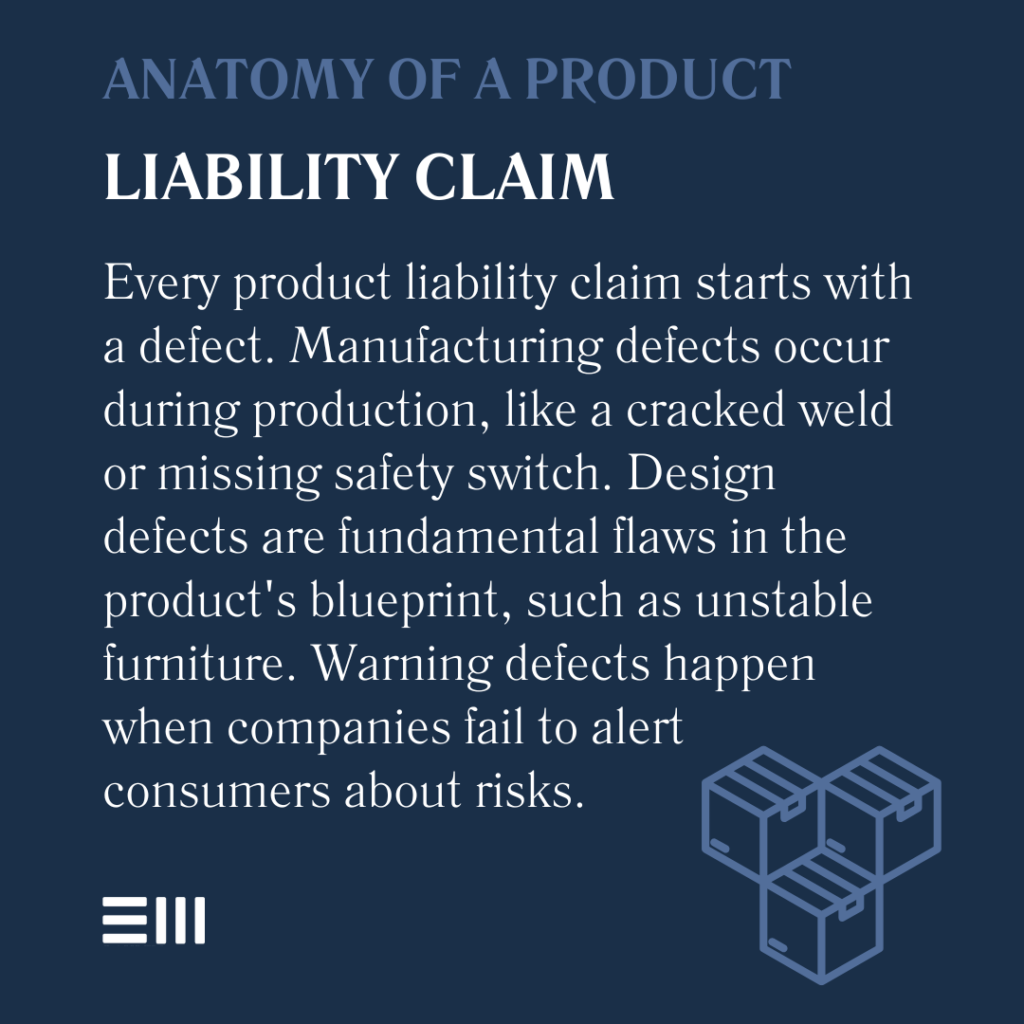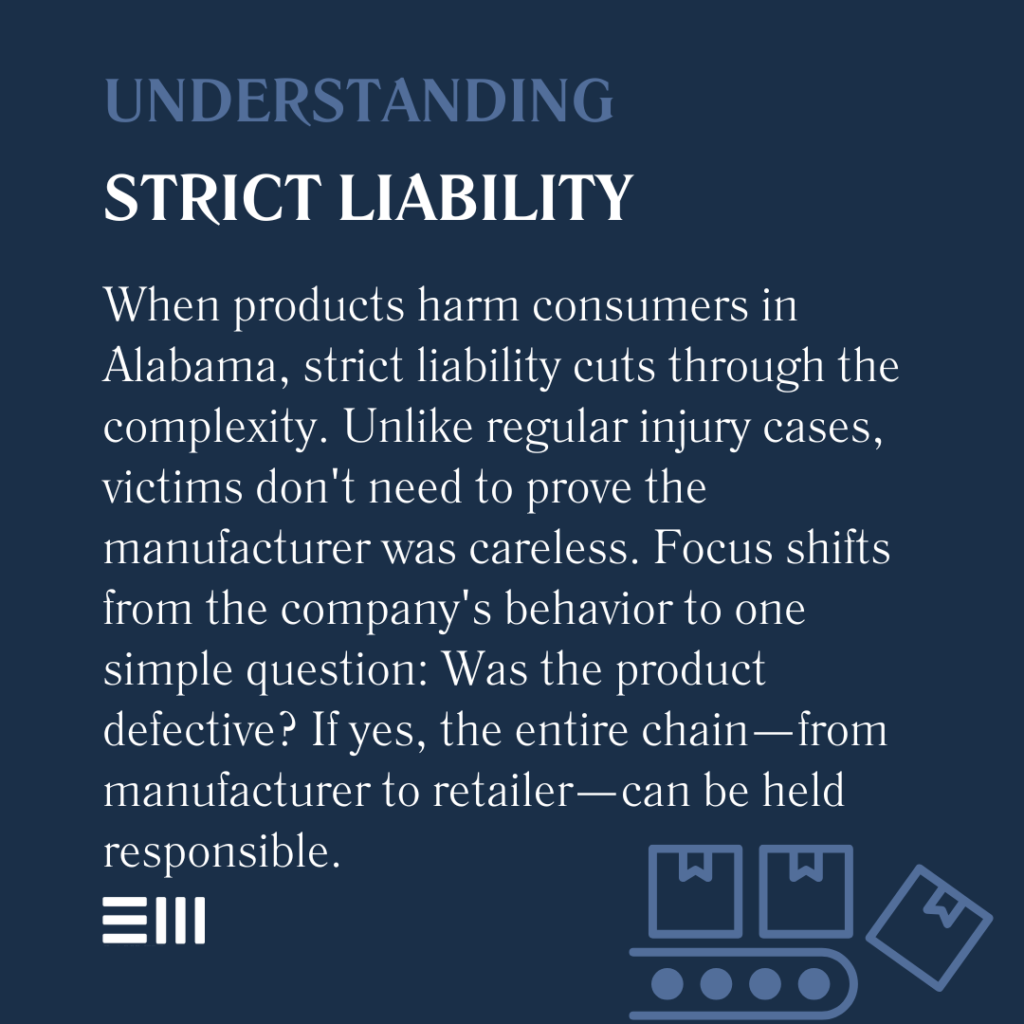
From kitchen appliances that burst into flames to children’s toys containing dangerous chemicals, defective products shatter more than just consumer trust—they destroy lives.
In Alabama courtrooms, these stories reveal the harsh reality: a father permanently disabled by faulty manufacturing equipment, a grandmother severely burned by an exploding pressure cooker, a child injured by a poorly designed toy.
Behind each case lies a fundamental question of accountability and the critical protections that product liability laws provide for Alabama families.
Understanding Product Liability in Alabama
Product liability laws establish the framework for holding manufacturers, distributors, and sellers accountable when their products cause harm.
These regulations protect consumers while ensuring businesses maintain high safety standards in their production processes.
Key elements of Alabama’s product liability framework include:
- Design defects that make products inherently dangerous;
- Manufacturing defects occurring during production;
- Marketing defects, including inadequate warnings or instructions;
- Strict liability standards that don’t require proof of negligence;
- Chain of distribution responsibility;
- Statute of limitations considerations;
- Burden of proof requirements;
- Available defenses for manufacturers;
- Comparative fault considerations; and
- Documentation requirements.
Understanding these elements helps both consumers and businesses navigate the complex landscape of product safety and accountability in Alabama’s legal system.

Types of Product Liability Claims
Before diving into specific claims, it’s important to recognize that product liability cases can arise from various circumstances, each with its own legal implications and requirements for proof.
Common types of product liability claims include:
- Manufacturing Defects;
- Assembly errors;
- Quality control failures; and
- Material defects.
Design Defects
- Inherent safety flaws;
- Poor engineering choices; and
- Inadequate safety features.
Failure to Warn
- Missing safety instructions;
- Inadequate labeling; and
- Insufficient hazard warnings.
Breach of Warranty
- Express warranty violations;
- Implied warranty breaches; and
- Fitness guarantee failures.
Misrepresentation
- False advertising;
- Deceptive marketing; and
- Performance claims.
Negligence in Testing or Inspection
- Inadequate quality control;
- Rushed safety testing; and
- Poor maintenance records.
Each type of claim requires different elements of proof and may involve distinct legal strategies for resolution. Understanding these variations helps determine the most effective approach for your specific case.
The Role of Strict Liability
Strict liability fundamentally changes how product injury cases proceed in Alabama courts. Unlike traditional negligence cases, strict liability focuses on the product’s condition rather than the manufacturer’s behavior.
Essential aspects of strict liability include:
- No need to prove manufacturer negligence;
- Focus on product defectiveness;
- Automatic liability if defect is proven;
- Applies to entire distribution chain;
- Requires proof of injury and causation;
- Economic loss considerations;
- Third-party liability implications;
- Defect classification standards;
- Burden of proof requirements; and
- Available defenses.
Understanding strict liability helps victims pursue justice while holding companies accountable for their products’ safety. This legal doctrine significantly simplifies the path to compensation for injured consumers.

Product Recalls: Understanding Your Rights
Product recalls serve as critical safety measures that protect consumers from dangerous or defective items. In Alabama, both voluntary and mandatory recalls carry specific legal implications and consumer protections.
When a recall occurs:
- Manufacturers must notify affected consumers;
- Retailers must remove products from shelves;
- Consumers have right to repair, replacement, or refund;
- Documentation becomes crucial for potential claims;
- Time limits may apply for seeking remedies;
- Safety notices must be prominently displayed;
- Return procedures must be clearly outlined;
- Repair facilities must be readily accessible;
- Alternative products may be offered; and
- Compliance monitoring is required.
Staying informed about recalls affecting your products helps protect your rights and ensure your family’s safety. Alabama residents can access recall information through various channels, including manufacturer websites, government databases, and consumer protection agencies.
Frequently Asked Questions About Product Liability in Alabama
Understanding product liability can be complex, but these common questions help clarify key aspects of your rights and responsibilities under Alabama law.
What Is the Time Limit for Filing a Product Liability Claim in Alabama?
In Alabama, you typically have two years from the date of injury to file a product liability claim. However, exceptions may apply under the “discovery rule” if the injury wasn’t immediately apparent.
How Do I Prove a Product Caused My Injury?
To establish causation, you must demonstrate that:
- The product was defective when it left the manufacturer;
- The defect directly caused your injury;
- You used the product as intended;
- The product hasn’t been substantially modified;
- You suffered actual damages;
- The defect was the proximate cause; and
- No superseding causes exist.
Meeting these requirements provides a strong foundation for your product liability claim, but documenting each element thoroughly is essential for success.
Can I File a Claim if the Product Had a Warning Label?
Yes, you may still have a valid claim if:
- The warning was inadequate;
- The warning wasn’t prominently displayed;
- The warning didn’t address your specific injury;
- The product was inherently dangerous despite the warning;
- The warning wasn’t in appropriate languages; and
- The warning failed to meet regulatory standards.
Even with warning labels present, manufacturers remain responsible for ensuring their warnings effectively communicate potential hazards to consumers.
Does a Recall Automatically Prove Liability?
A recall alone doesn’t automatically establish liability, but it can:
- Serve as evidence of a defect;
- Support your claim of product danger;
- Help establish manufacturer knowledge;
- Strengthen your overall case;
- Document the scope of the problem; and
- Demonstrate manufacturer awareness.
While recalls provide valuable evidence, building a strong liability case requires demonstrating how the recalled product specifically caused your injuries.
What Compensation Can I Recover in a Product Liability Case?
Potential compensation includes:
- Medical expenses;
- Lost wages;
- Pain and suffering;
- Property damage;
- Long-term care costs;
- Rehabilitation expenses;
- Loss of earning capacity;
- Emotional distress;
- Loss of consortium; and
- Punitive damages.
These frequently asked questions represent common concerns in product liability cases, but each situation is unique and may require specific legal analysis to determine the best course of action.
Protecting Your Rights in Alabama
When defective products impact your life, you deserve experienced legal representation to navigate the complexities of product liability law. Our team stands ready to evaluate your case and fight for the compensation you deserve.
Contact our product liability attorneys today for a confidential consultation and learn how we can help protect your rights. Let our experience guide you through this challenging time while we work to hold manufacturers accountable for their products’ safety.
Can't find what you're looking for? Search our site below.










